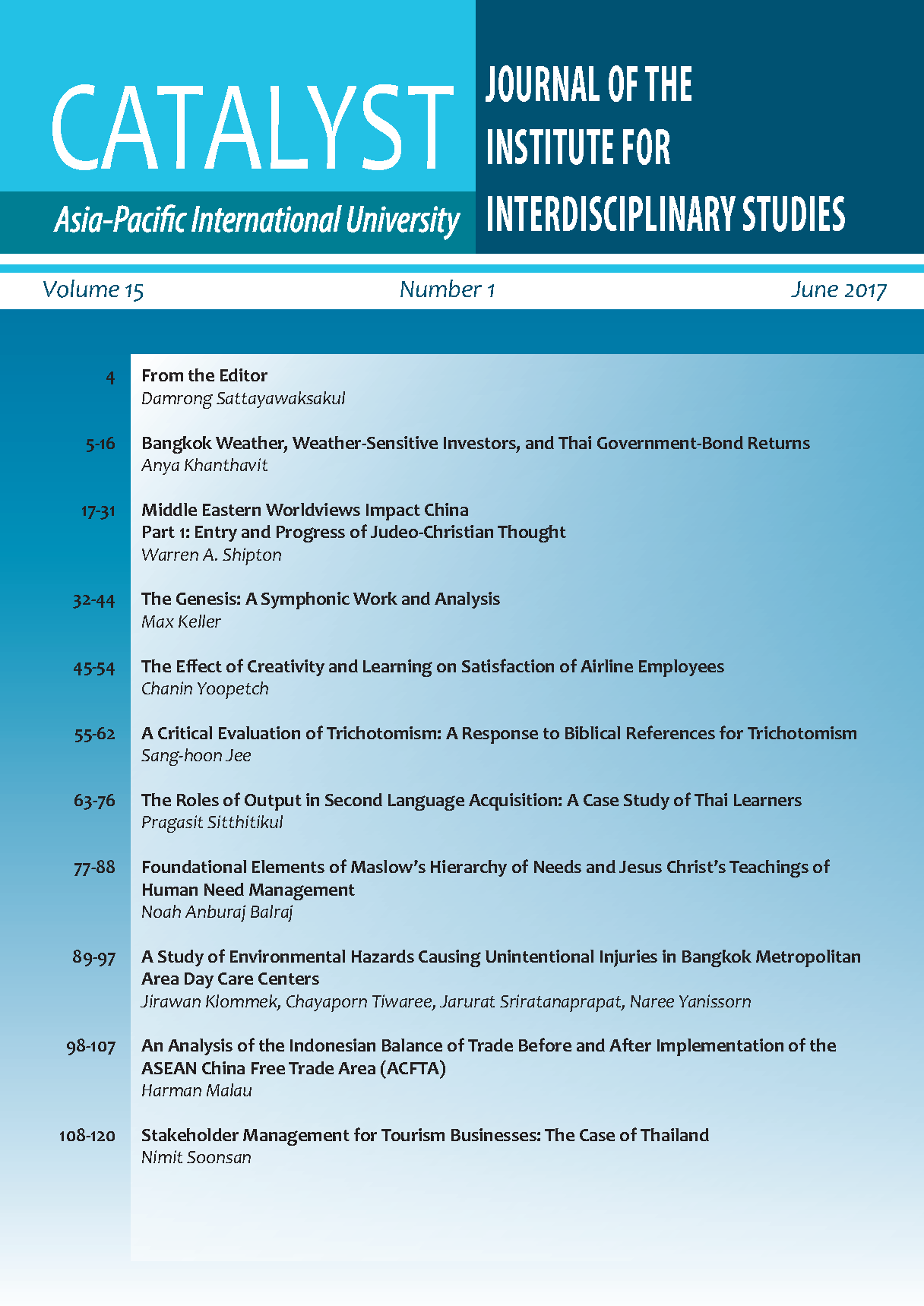Bangkok Weather, Weather-Sensitive Investors, and Thai Government-Bond Returns
Main Article Content
Abstract
If the market is not efficient, bond returns can be set by weather-sensitive investors, thereby establishing a significant relationship between weather and investment returns. This study is the first study to test for the weather effects in the Thai government-bond market. Using a bond-return sample from July 2, 2001 to December 2015, applying full-period and sub-period tests, together, suggest that weather effects, especially temperature, exist in the Thai bond market. The effects do not weaken or disappear over time. They are, however, significant in some but not in the other sub-periods, and for some but not all the bonds. These findings are consistent with the explanation that the weather-sensitive investors participate in the inefficient bond market only in some periods and they prefer certain bonds over the others.
Article Details

This work is licensed under a Creative Commons Attribution-NonCommercial-NoDerivatives 4.0 International License.
Copyright: Asia-Pacific International University reserve exclusive rights to publish, reproduce and distribute the manuscript and all contents therein.
References
Apergis, N., Gabrielsen, A., & Smales, L. A. (2016). (Unusual) weather and stock returns‒I am not in the mood for mood: Further evidence from international markets. Financial Markets and Portfolio Management, 30(1), 63-94.
Asian Development Bank. (2016). Asia Bond Monitor. March 2016. Retrieved from https:// asianbondsonline.adb.org/documents/abm_mar_2016.pdf
Buraprathep, S., Khanthavit, A., & Pattarathammas, S. (2015). Moving toward efficiency: The study of time-varying informational efficiency in the Stock Exchange of Thailand (Research Report). Bangkok: Faculty of Commerce and Accountancy, Thammasat University. Retrieved from https://DOI: 10.13140/RG.2.1.4282.5367
Cao, M., & Wei, J. (2005). Stock market returns: A note on temperature anomaly. Journal of Banking and Finance, 29(6), 1559-1573.
Chaitip, P., T. Sriwichailampan, Sriboonchitta, S., & Chaiboonsri, C. (2010). Stock market returns: Evidence from four Asian markets using generalized extreme value estimation. International Journal of Business Research, 10(3), 76.
Chang, T., Nich, C., Yang, M. J., & Yang, T. (2006). Are stock market returns related to the weather effects? Empirical evidence in Taiwan. Physica A, 364, 343-354.
Dowling, M., & Lucey, B. M. (2005). Weather, biorhythms, beliefs and stock returns‒Some preliminary Irish evidence. International Review of Financial Analysis, 14(3), 337-355.
Dowling, M., & Lucey, B. M. (2008). Robust global mood influences in equity pricing. Journal of Multinational Finance, 18(2), 146-164.
Forgas, J. P. (1995). Mood and judgment: The affect infusion model (AIM). Psychological Bulletin, 177(1), 39-66.
Furhwirth, M., & Sogner, L. (2015). Weather and SAD related effects on the financial market. Quarterly Review of Economics and Finance, 57, 11-31.
Goetzmann, W., & Zhu, N. (2005). Rain or shine: Where’s the weather effect? European Financial Management, 11(5), 559-578.
Hirshleifer, D., & Shumway, T. (2003). Good day sunshine: Stock returns and the weather. Journal of Finance, 58(3), 1009-1032. Howarth, E., & Hoffman M. S. (1984). A multidimensional approach to the relationship between mood and weather. British Journal of Psychology, 75(1), 15-23.
Jacobson, B., & Marquering, W. (2008). Is it weather? Journal of Banking and Finance, 32(4), 526-540.
Kang, S., Jiang, Z., Lee, Y., & Yoon, S. (2010). Weather effects on the returns and volatility of the Shanghai stock market. Physica A, 389(1), 91-99.
Keef, S. P., & Roush, M. L. (2005). Influence of weather on New Zealand financial securities. Accounting & Finance, 45(3), 415-437.
Keef, S. P., & Roush, M. L. (2007). Daily weather effects on the returns of Australian stock indices. Applied Financial Economics, 17(3), 173-174.
Khanthavit, A. (2016). The fast and slow speed of Convergence to market efficiency: A note for large and small stocks on the Stock Exchange of Thailand. Social Science Asia, 2(2), 1-6.
Khanthavit, A., & Chaowalerd, O. (2016). Revisiting the day-of-the-week effect in the Stock Exchange of Thailand (Research Report). Bangkok: Faculty of Commerce and Accountancy, Thammasat University. Retrieved from https:// DOI: 10.13140/RG.2.1.2285.2729
Lu, J., & Chou, R. K. (2012). Does the weather have impacts on returns and trading activities in orderdriven stock markets? Evidence from China. Journal of Empirical Finance, 19(1), 79-93.
Lucey, B., & Dowling, M. (2005). The role of feelings in investor decision-making. Journal of Economic Surveys, 19(2), 211-237.
McMorris, T., Swain, J., Smith, M., Corbett, J., Delves, S., Sale, C., Potter, J. (2006). Heat stress, plasma concentrations of adrenaline, noradrenaline, 5-hydrotryptamine and cortisol, mood state and cognitive performance. International Journal of Psychophysiology, 61(2), 204-215.
Mehra, R., & Sah, R. (2002). Mood fluctuations, projection bias, and volatility of equity prices. Journal of Economic Dynamics and Control, 26(5), 869-887.
Menard, S. (2002). Applied Logistic Regression Analysis (2nd ed.). United States of America: Sage Publications.
Modigliani, F., & Sutch, R. (1966). Innovations in interest rate policy. American Economic Review, 56(12), 178-197.
Nastos, P. T., Paliatsos, A. G., Tritakis, V. P., & Bergiannaki, A. (). Environmental discomfort and geomagnetic field influence on psychological mood in Athens, Greece. Indoor and Built Environment, 15(4), 365-372.
Nirojsil, N. (2009). Are stock market returns related to the weather effects? Empirical evidence from Thailand (unpublished master’s independent study). Bangkok: Faculty of Commerce and Accountancy, Thammasat University. Retrieved from http://mif2.tbs.tu.ac.th/ getFileDownload. php?path=02/file_doc/6620131119040712.pdf
Pardo, A., & Valor, E. (2003). Spanish stock returns: Where is the weather effect? European Financial Management, 9(1), 117-126.
Saunders, E. M., Jr. (1993). Stock prices and the Wall Street weather. American Economic Review, 83(5), 1337-1345.
Sriboonchitta, S., Chaitip, P., Sriwichailamphan, T., & Chaiboonsri C. (2014). Stock market returns and the temperature effects: Thailand. Global Journal of Marketing and Management, 1(1), 11-15.
Trombley, M. A. (1997). Stock prices and Wall Street weather: Additional evidence, Quarterly Journal of Business and Economics, 36(3), 11-21.
Worthington, A. (2009). An empirical note on weather effects in the Australian stock market, Economic Papers, 28(2), 148-154.
White, H. (1980). A heteroskedasticity-consistent covariance matrix estimator and a direct test for heteroskedasticity. Econometrica, 48(4), 817‒838.
Wurtman, R. J., & Wurtman, J. J. (1989). Carbohydrates and depression. Scientific American, 260(1), 68-75.
Yoon, S., & Kang, S. H. (2009). Weather effects on returns: Evidence from the Korean stock market. Physica A, 388(5), 682-690.


